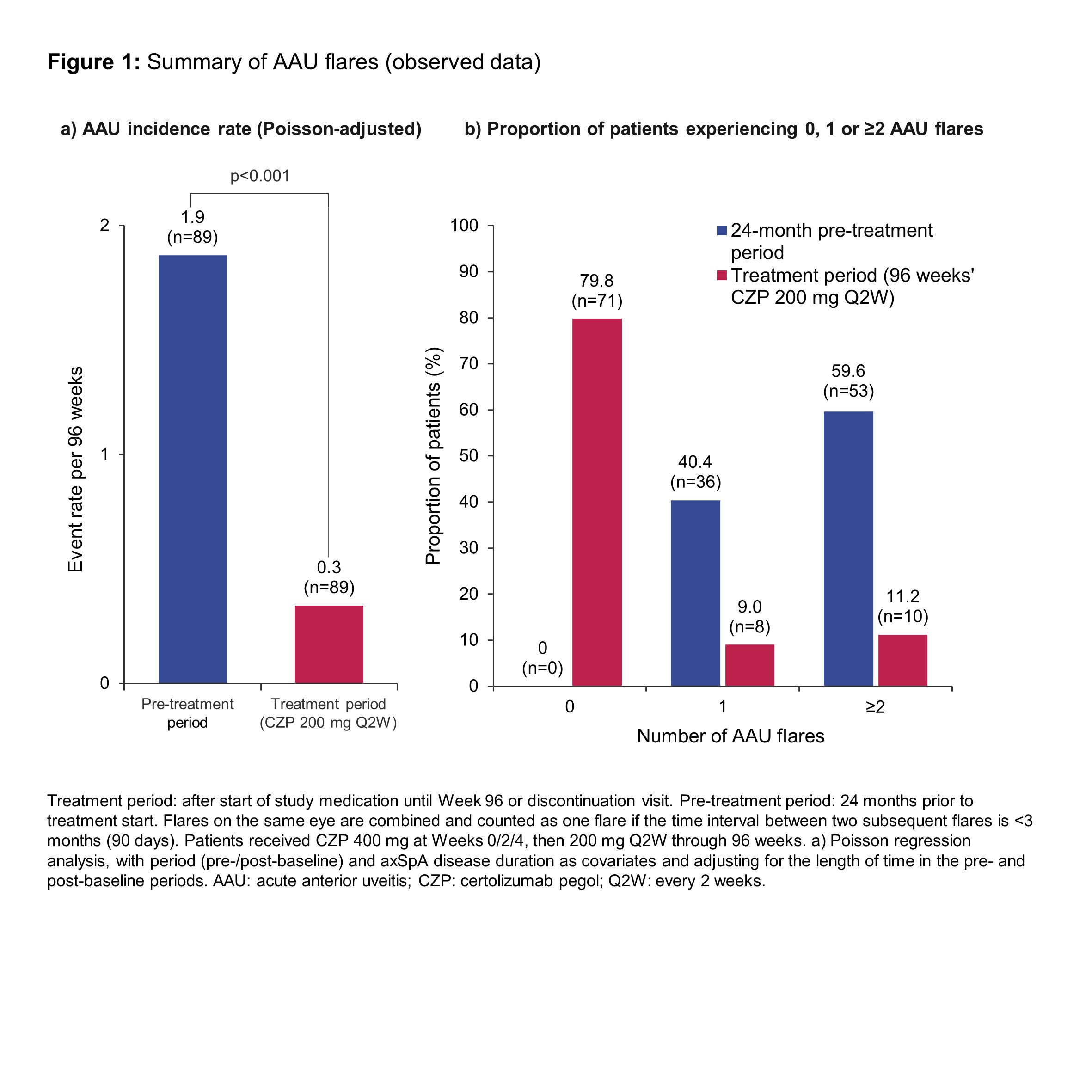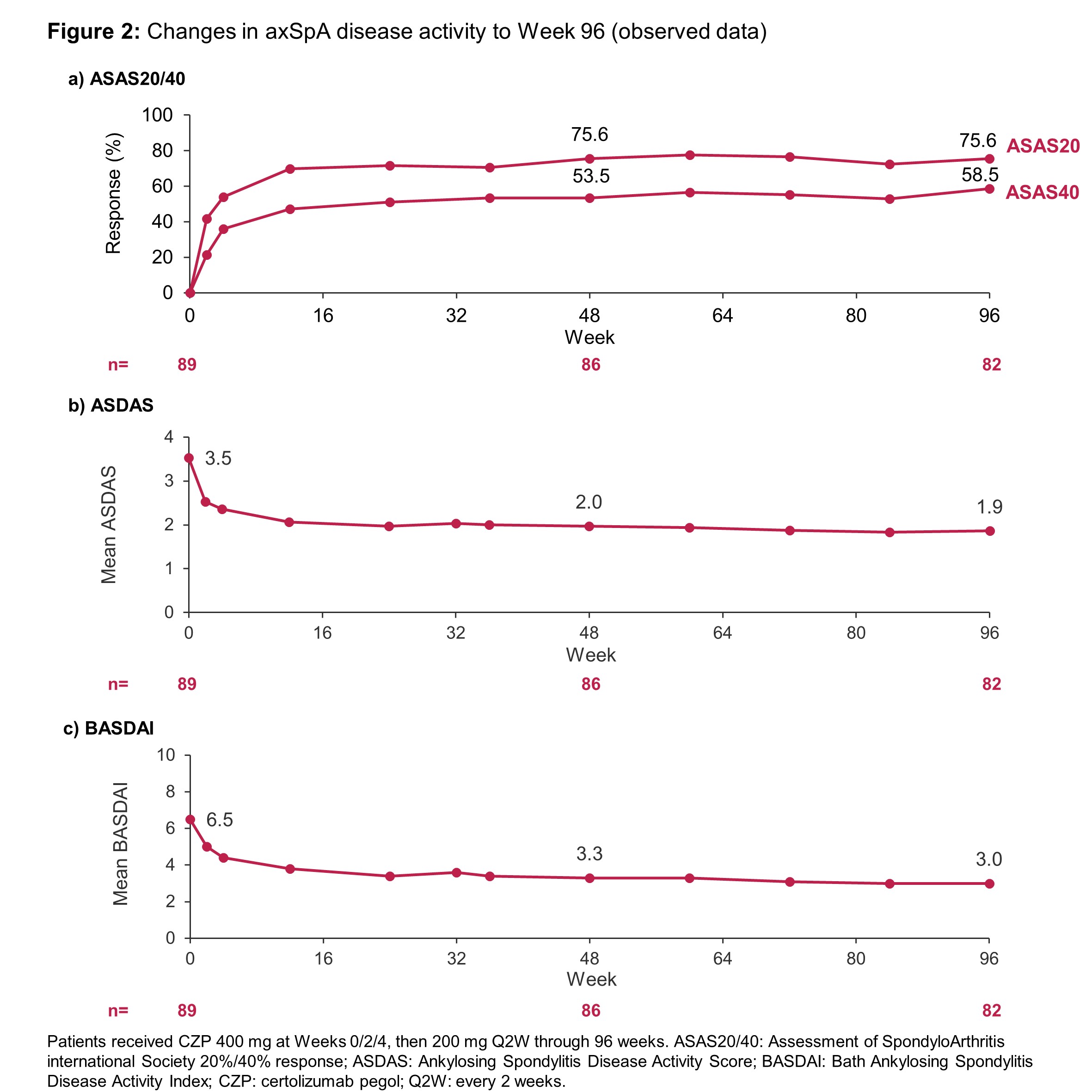Session Information
Date: Saturday, November 7, 2020
Title: Spondyloarthritis Including Psoriatic Arthritis – Treatment Poster II
Session Type: Poster Session B
Session Time: 9:00AM-11:00AM
Background/Purpose: Acute anterior uveitis (AAU) is the most common extra-articular manifestation in axial spondyloarthritis (axSpA), affecting up to 40% of patients and causing significant burden.1 Previous studies have shown that tumor necrosis factor inhibitors (TNFi) can reduce the incidence of AAU flares in patients with radiographic axSpA (ankylosing spondylitis),2-4 but few have focused on patients across the full axSpA spectrum. We report 2-year outcomes from the phase 4, open-label C‑VIEW study (NCT03020992), which investigated the impact of certolizumab pegol (CZP) treatment on AAU in patients with active axSpA and a recent history of AAU.
Methods: C-VIEW prospectively investigated patients with active axSpA who were HLA-B27 positive and had recurrent AAU, with a history of ≥1 AAU flare in the year prior to baseline (additional study criteria and study design are described elsewhere5). The primary efficacy variable was the incidence of AAU flares during 96 weeks of CZP treatment versus the 2-year pre-baseline period. AAU incidence was evaluated using Poisson regression adjusted for duration of time in each period, with period (pre- and post-baseline) and axSpA disease duration as covariates. Secondary efficacy variables were Assessment of SpondyloArthritis international Society 20%/40% (ASAS20/40) response rates, as well as mean Ankylosing Spondylitis Disease Activity Score (ASDAS) and mean Bath Ankylosing Spondylitis Disease Activity Index (BASDAI) to Week 96.
Results: Of 115 enrolled patients, 89 initiated CZP treatment; 83 completed Week 96. The primary analysis revealed an 82% reduction in the incidence of AAU flares during CZP treatment compared with pre-baseline (Figure 1; rate ratio [95% CI]: 0.18 [0.12, 0.28], p< 0.001). The percentage of patients experiencing ≥1 and ≥2 AAU flares reduced from 100% and 59.6% pre-baseline to 20.2% and 11.2% during treatment. There were also improvements in axSpA disease activity (Figure 2): by Week 96, 75.6% and 58.5% of patients had achieved ASAS20 and ASAS40 responses, respectively. ASDAS and BASDAI also improved substantially over the 96-week treatment period. No new safety signal was identified, compared to previous reports.5
Conclusion: These data support the use of CZP for the treatment of patients with axSpA and a history of recurrent AAU. During 96 weeks’ CZP treatment, there was a significant reduction of 82% in the AAU flare rate compared to pre-baseline. There were also substantial improvements in patients’ axSpA disease activity.
References: 1. Martin TM. Curr Opin Rheumatol 2002;14:337–41; 2. van der Heijde D. Rheumatology (Oxford) 2017;56:1498–1509; 3. van Bentum RE. J Rheumatol 2019;46:153–9; 4. van Denderen JC. J Rheumatol 2014;41:1843–8; 5. van der Horst-Bruinsma I. RMD Open 2020;6:e001161.
To cite this abstract in AMA style:
van der Horst-Bruinsma I, van Bentum R, Verbraak F, Rath T, Rosenbaum J, Hoepken B, Irvin-Sellers O, Kumke T, Bauer L, Rudwaleit M. Reduction of Anterior Uveitis Flares in Patients with Axial Spondyloarthritis During Certolizumab Pegol Treatment: 96-Week Results from the C-VIEW Study [abstract]. Arthritis Rheumatol. 2020; 72 (suppl 10). https://acrabstracts.org/abstract/reduction-of-anterior-uveitis-flares-in-patients-with-axial-spondyloarthritis-during-certolizumab-pegol-treatment-96-week-results-from-the-c-view-study/. Accessed .« Back to ACR Convergence 2020
ACR Meeting Abstracts - https://acrabstracts.org/abstract/reduction-of-anterior-uveitis-flares-in-patients-with-axial-spondyloarthritis-during-certolizumab-pegol-treatment-96-week-results-from-the-c-view-study/


